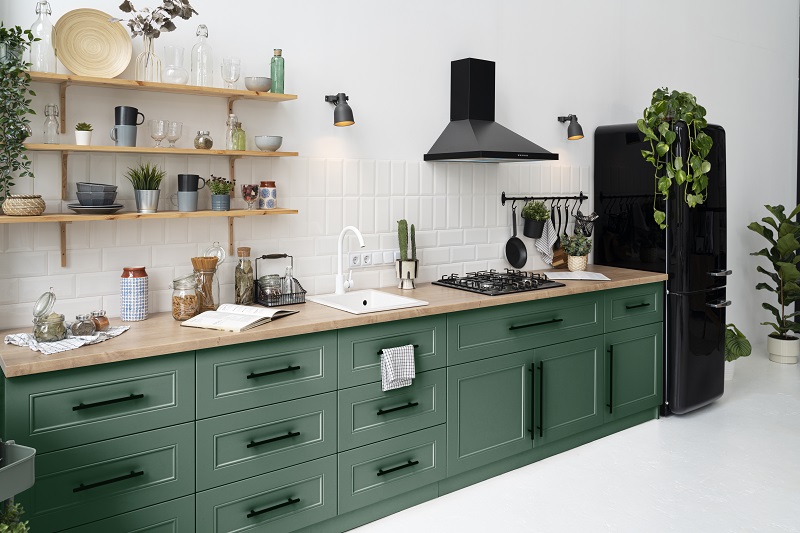The kitchen is often considered the heart of the home, a place where families gather, and culinary dishes are prepared. It’s no wonder that revamping the kitchen ranks among the top choices for homeowners when it comes to upgrading their homes. However, a major hurdle most of the homeowners face when planning a kitchen renovation is understanding the factors that affect kitchen renovation costs. Depending on the different elements and options chosen during the renovation process, the price of a kitchen remodel can vary greatly. In this comprehensive guide, we’ll highlight the major factors that contribute to kitchen remodel costs and provide practical tips to help you achieve the kitchen of your dreams while keeping your budget in mind.
Let’s start with the Secrets behind kitchen remodeling costs
1. Scope of the kitchen remodeling project
The first factor that significantly affects kitchen remodeling cost is the scope of the project. Are you planning a minor makeover with cosmetic changes or a complete makeover involving structural modifications? The extent of the remodel, such as replacing cabinets, countertops and appliances, or reconfiguring the layout, will have a direct bearing on the overall cost.
Tip: Prioritize your remodeling goals and focus on the areas that will make the most significant impact on functionality and aesthetics while staying within your budget.
2. Materials and Finishes
Material and finish selection can make or break your kitchen remodel budget. High-quality materials like granite or quartz countertops, custom cabinetry, and hardwood floors come with premium price tags. On the other hand, budget-friendly options like laminate countertops and pre-fabricated cabinets can help keep costs in check without compromising on style.
Tip: Strike a balance between aesthetics and cost-effectiveness by combining some high-end materials with more budget-friendly options.
3. Equipment
Kitchen appliances are another important factor that affects the total cost of a kitchen remodel. High-end, energy-efficient appliances from reputable brands can add considerable expense to your budget. Additionally, factors such as size, features, and finishes can also affect the cost.
Tip: Consider investing in energy-efficient appliances, as they can lead to long-term savings on utility bills while increasing the overall value of your home.
4. Plumbing and Electrical Work
If your kitchen remodel involves moving fixtures, sinks or major appliances, expect additional costs for plumbing and electrical work. Relocating water supply lines, drains, or electrical outlets can be complicated and time-consuming, which will directly affect overall expenses.
Tip: Try to keep as much of the existing plumbing and electrical layout intact as possible to keep costs down. For the best plan of action, seek guidance from a qualified expert.
5. Labor Cost
Labor costs play a significant role in the total price of your kitchen remodel. Experienced contractors and skilled craftsmen delivering high-quality work can command higher rates, but their expertise is invaluable in ensuring a successful renovation.
Tip: Get multiple quotes from reputable contractors and check references to strike the right balance between cost and craftsmanship.
6. Permits and Regulations
Depending on the scope of your kitchen remodel, you may need to obtain permits from local authorities. These permits are necessary to ensure that your renovation complies with building codes and safety regulations. Permit costs can vary depending on your location and the complexity of the project.
Tip: Work with your contractor to determine required permits and related costs to factor them into your budget from the start.
7. Unexpected Issues
Like any renovation project, unexpected problems can arise during a kitchen remodel. These unexpected challenges, such as hidden water damage, electrical problems, or structural issues, can lead to additional expenses.
Tip: Set aside a contingency budget of around 10-20% of your total renovation cost to deal with any unforeseen issues that may arise.
Conclusion about kitchen remodeling costs
In conclusion, it is important to understand the factors that affect kitchen remodel cost in order to plan a successful and budget-friendly renovation. By carefully considering project scope, material choices, equipment, plumbing, electrical work, labor costs, permits and unforeseen issues, you can create a comprehensive budget that fits your vision and financial capabilities. Remember to strike a balance between aesthetics and cost-effectiveness to get a kitchen that not only fulfills your dreams but also enhances the value of your home.
So, whether you’re planning a small kitchen update or a major makeover, armed with this knowledge, you can begin your kitchen remodeling journey with confidence and the expensive puzzle to create the kitchen of your dreams.




